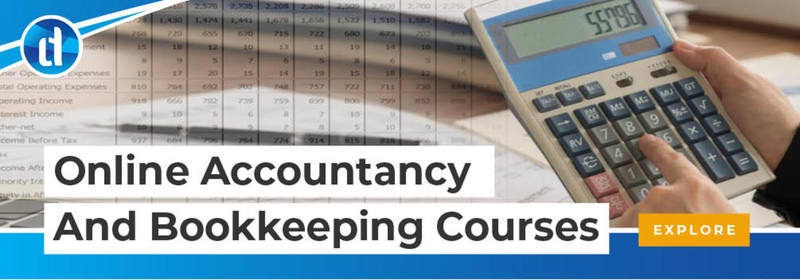If you’re looking for a career working with numbers, you’ve likely considered accountancy and bookkeeping. Both professions revolve around the financial health of a business and both offer excellent career prospects. But whether you should study bookkeeping or accounting will depend on what you’re looking to achieve and where your interests lie.
Many people believe that accountants and bookkeepers do the same job. While there is some overlap, and the titles can be used interchangeably, they are two very different professions with distinct responsibilities.
Both roles are in high demand, which can provide job security. And both professions offer employees the opportunity to work for themselves and enjoy flexible working hours. However, bookkeeping has fewer barriers to entry, so learners can qualify quickly and for less overall expense. Whereas aspiring accountants take a while longer to become qualified, but they’re rewarded with significantly higher earning potential.
Before choosing whether you should study bookkeeping or accounting, you need to understand the differences between them. To help, we’ve provided more detail on each role, plus the courses you can take to become qualified.

The Difference Between Accounting and Bookkeeping
Bookkeeping is the first part of the accounting process. So this is where a lot of the overlap and confusion stems from.
Bookkeepers focus on recording and organising a company's financial data, from which accountants draw much bigger and broader conclusions. As such, many bookkeeping and accounting professionals work side by side. Or at least have a lot of contact with each other on behalf of their respective clients.
Bookkeeping
As a bookkeeper, you’re responsible for keeping accurate and complete records of the financial transactions of a business. Ensuring payments and receipts are logged accurately and the correct amounts are paid and received on time.
You’ll log transactions using a prescribed set of procedures, tallying them up both at the end of the day and each month. Other typical duties include:
- Issuing invoices
- Paying suppliers
- Processing payroll
- Recording cash receipts, invoices and inventory
All of which helps the company stay efficient and aware of where they sit financially.
Accounting
As an accountant, you focus your time assessing the bigger financial picture, which involves utilising the data provided by bookkeepers. With this information, you would then classify, analyse, summarise, interpret and report on a company’s financial information.
You add meaning to their financial data by carrying out audits, generating their financial statements and evaluating efficiency. All of which enables you to forecast the company’s future business needs and helps keep them financially on track.

How to Get Started in Either Profession
Currently, the quickest way into the finance sector is by taking industry-recognised vocational courses. The AAT is an excellent online provider, offering a variety of bookkeeping and accounting qualifications at different levels. All of which can take you from novice to pro, preparing you to study for your professional exams.
Courses to Take to Become a Bookkeeper
These courses can be completed within 6-12 weeks and enable you to progress quickly into several bookkeeping roles.
Level 2 Certificate in Bookkeeping
This introductory course prepares you for bookkeeping roles through key modules like double-entry bookkeeping, calculating sales invoices and credit notes. After you successfully complete this foundation course, you can secure employment as a Clerical Assistant, Trainee Bookkeeper or Accounts Clerk.
Level 3 Certificate in Bookkeeping
An ideal follow-on to the foundation certificate, this advanced certificate enables you to progress to more senior roles. You’ll learn everything required to carry out complex bookkeeping transactions. Exploring more challenging subjects like advanced bookkeeping, final accounts preparation, and indirect tax. Which all helps develop your existing skills and knowledge to an advanced level.
After completing this course, you can pursue employment as a Professional Bookkeeper, Accounts Manager or Ledger Manager.
Courses to Take to Become an Accountant
These AAT accounting courses take between 6-18 months to complete and can lead you into many dynamic accounting careers.
Level 2 Certificate in Accounting
This beginners course is a great starting point for aspiring accountants, teaching you everything you need to secure entry-level roles. It will teach you about bookkeeping transactions and controls, the elements of costing and how to use accounting software. After which, you’ll be ready to start managing client books and handle basic accounting duties.
After this course, you can secure employment as an Accounts Administrator, Purchase/Sales Ledger Clerk or Trainee Accounting Technician.
The next stage is to take on their Level 3 Advanced Diploma. This allows you to take on more senior roles, as it challenges you with more complex tasks and advanced subjects. Throughout the course, you’ll cover modules like accounting principles and concepts, advanced bookkeeping and final accounts.
Once qualified, you’ll be eligible for employment as an Accounts Payable Clerk, Assistant Accountant or Credit Controller.
Level 4 Diploma in Professional Accounting
The most advanced qualification offered by the AAT. This Level 4 Professional Diploma helps you achieve full AAT membership and professional MAAT status. You’ll study complex accounting theory and learn how to expertly draft financial statements for limited companies. After completion, you’ll also be able to recommend strategies around accounting systems.
During the course, you have the chance to specialise in two subjects, the options to choose from are:
- Business Tax
- Personal Tax
- External Auditing
- Cash and Treasury Management
- Credit Management
With this diploma, you can seek employment as an Assistant Financial Accountant, Commercial Analyst or Indirect Tax Manager. After which, you can go onto study as a Chartered Accountant.

Study Bookkeeping or Accounting Online
Online courses are a great way to upskill around your busy lifestyle. This flexible learning approach allows you to study at home to get the qualifications you need for a new career. These online AAT courses are also studied at your own pace, so you can complete them as quickly or slowly as you like.
The qualifications provided by the Association of Accounting Technicians (AAT) are universally respected and internationally recognised. So, whether you study bookkeeping or accounting, you can gain skills you can take with you around the globe.
They’re also regulated by all four UK qualification regulators; Ofqual (England), CCEA (Northern Ireland), SQA (Scotland) and Qualifications Wales. So you can be assured of their quality and effectiveness at equipping you with the necessary skills for your career.
You don’t need any experience to get started, so you can take the next step towards your career today. You can also take advantage of flexible payment methods and once you enrol you’ll receive assistance from a professional tutor.
learndirect is the leading UK distance learning provider. Offering many AAT courses to help you gain practical, real-world accounting and bookkeeping skills that are desirable to employers.
The AAT's foundation certificates qualify you for several entry-level positions. So, if you’re eager to make the move into a financial role, your career can start sooner than you might think.
Find out more about how you can take the next step, by viewing our AAT Faculty below.




















